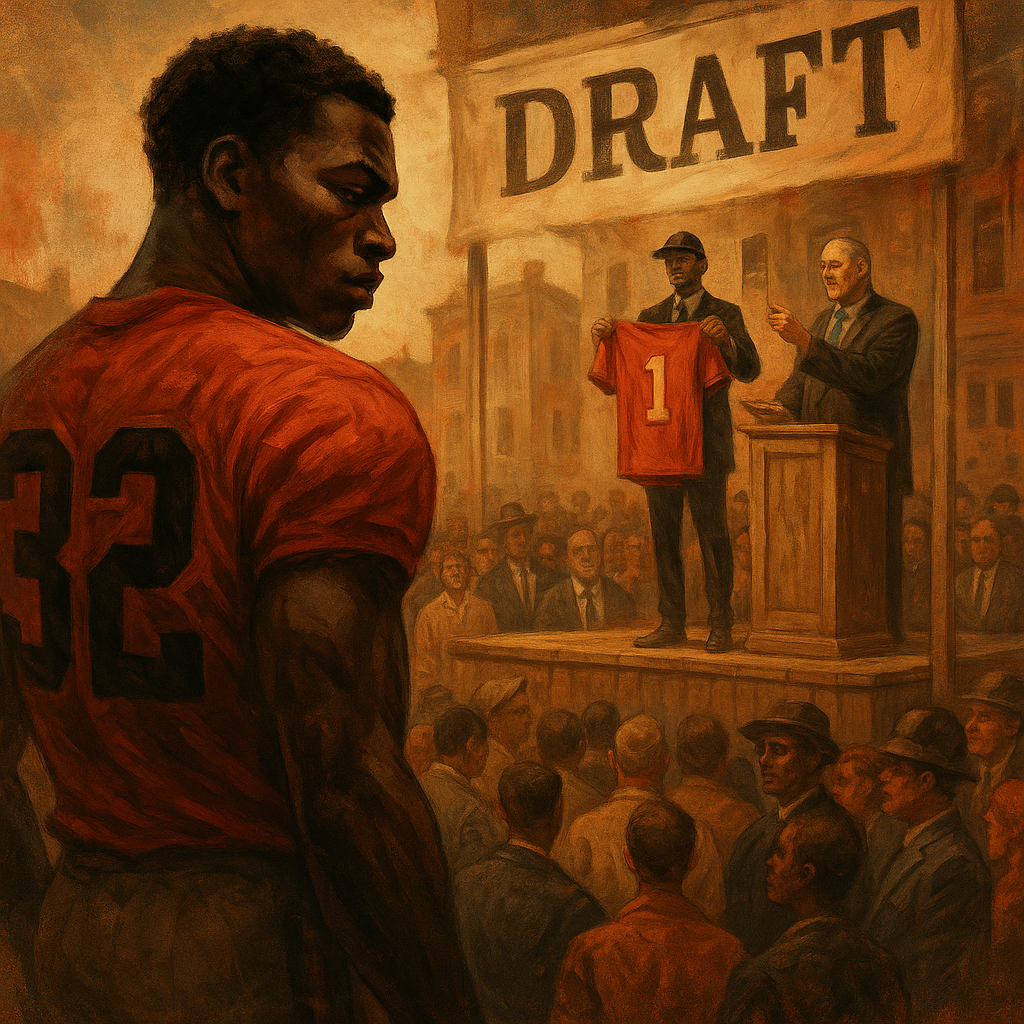How the Spectacle Rewired Us
By Dr. Leo Croft | Stix Intel
Let me tell you a story—not one you’ll find in history books, but one that lives in your memory, your neighborhood, your living room.
You ever watch the NBA Draft? Or the NFL Draft? No, I mean really watch it. Not just the pick announcements and the cheers, but the choreography of it. The pageantry. The way the lights hit the stage just right. The soft, emotional music swelling when a mother wipes away a tear. The handshake with the commissioner, the hat placed neatly on the head of a young Black man in a tailored suit, who five minutes ago was just a name on a list—and now is “the future” of a franchise. It’s powerful. It’s cinematic. And it’s deeply familiar.
Because if you strip away the glitter, the billion-dollar branding, the ESPN set pieces and hashtags… you’ll notice something else. A script that’s been playing out for centuries.
We’ve seen it before. A young Black body on display. Ranked, measured, selected. Celebrated, but never truly free. Sold, not as a person—but as potential. And it may not come with chains anymore, but the system still assigns value, still assumes ownership, still controls the terms of who gets chosen, who gets paid, and who gets discarded when the knees give out or the contract ends.
That’s what hit me the first time I really saw the Draft—not just watched it, but felt it for what it was. And suddenly, it wasn’t just a sports event. It was a ritual. A modern-day echo of something much older and much darker. It felt like the auction block had never left. It had just rebranded.
Now, I know someone out there is thinking, “You’re going too far. These young men are getting life-changing money. This isn’t slavery. This is opportunity.” And to that, I say—yes, they are getting money. But don’t confuse the exception for the system. For every young man whose name gets called on draft night, there are thousands whose dreams were programmed, pushed, and then broken by a narrative that was never designed to serve them. This is the trap we don’t talk about.
You see, they told us this was the dream. That this was how we escape. That if you want to make it out the hood, out the projects, out of whatever reality was handed to you, all you had to do was run faster, jump higher, shoot better. Coaches told us. Teachers echoed it. Music reinforced it. And our communities—tired, hungry for a win, desperate to see somebody make it—clapped along and passed the dream down like gospel.
And over time, it shaped us. It shaped who we listened to, who we trusted, who we believed in. We revered the athlete. We worshipped the hustle. And somewhere in the process, we stopped honoring the scholar. We stopped encouraging the builder. We stopped listening to the ones who wanted to lead from behind a book instead of a ball.
This wasn’t just economic. It was psychological. Generational. Engineered.
They made intellect feel foreign to us. They taught us that the classroom was for “them.” That straight-A students were “acting white.” That speaking with confidence and precision meant you weren’t “real.” And so we lost something. Not because we didn’t have it—but because they convinced us it wasn’t ours.
And meanwhile, who’s running the teams? Who’s sitting in the skyboxes? Who’s controlling the contracts, the marketing deals, the broadcast rights? It ain’t us.
That’s why this matters.
Because it’s not just about sports. It’s about programming. It’s about who gets visibility, who gets a voice, and who gets positioned as “the way.” And when every major celebration of Black success comes through the lens of physical performance for profit, it sends a message loud enough to shape a generation. That message says: Your body is your currency. Your worth is physical. Your future is limited to who selects you.
But I’m here to tell you—we were never just athletes. We are strategists. Creators. Scientists. Architects. And the further we get from that truth, the easier it becomes to control us.
So yes, the Draft is exciting. And yes, we should celebrate our brothers who make it. But we should also be honest about the full picture. Because the more we understand the story they’re selling us, the more power we gain to write our own.
The next time you watch a draft, ask yourself this: why is this moment televised like a coronation? Why is this spectacle so emotionally constructed, so deliberately staged, when other career milestones—becoming a doctor, a judge, a professor—happen in silence?
Why are the dreams we cheer for always the ones that involve Black bodies being used, not leading?
Why do our sons know the names of athletes before they know the names of authors or inventors?
Why do our schools build gyms before they build libraries?
Why are Black students still suspended for asking questions, while Black athletes are protected for scoring points?
This isn’t random. This is design.
And once you see it, you can’t unsee it.
We were taught to cheer for the cage.
But it’s time to break the damn thing down.
—Dr. Leo Croft | Stix Intel
“If you can be programmed, you can be repurposed. If you can be sold, you can be stolen. We fight to remember what we were before the spectacle.”

